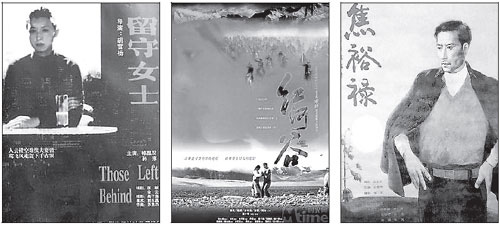 |
|
The posters of Chinese films, (from left to right) Those Left Behind, Red River Valley and Jiao Yulu, that Wu recommends.
|
The book, a compilation of his lectures and panel discussions, are full of humor, exaggerations, caricatures and some oddities. It is a must-read for foreign students studying Chinese at Lund University, says Michael Schoenhals, a professor of Chinese Studies at the university's Center for Languages and Literature.
"It's very lively with the stories and language. The wisdom and culture shown in it are very interesting and nuanced," he says.
In 1999, at Lund University, Wu had screened Jiao Yulu (1990), a film directed by Wang Jixing about the real life of a Chinese public servant called Jiao Yulu, who ignores his liver cancer to work on flood control in Lankao, Henan province, but dies at the end. The biopic, which depicts a scene in which Jiao presses his stomach against the arm of a chair to ease the pain, is currently being shown in China, 50 years after Jiao's death.
"My students say that working under such conditions is irresponsible. But we regard him as the epitome of serving the people, with his heart and soul," Wu says of the movie.
He says that Chinese people have always looked up to heroes, in a tradition that dates back to the Han Dynasty (202 BC-AD 220), when coveted official positions were given not to people with great education or governance skills but those that held on to high moral standards.
"After 1949, we slowly developed a habit of celebrating these kind of men through films and art, highlighting their morality," Wu says. "They are mainstream films in China but very alien to people outside."
According to Ivan Hanse, a student at Lund University, Wu is able to throw a challenge at foreign students with his selection of "typical Chinese patriotic films". "It was meant to lead us to think more about the country's political and conceptual differences from ours," Hanse says.
The book also records Wu's own surprises at such differences.
"I had spent a summer in Germany and came back to find my salary had jumped a few thousand krones. It was so puzzling," he recalls. It turned out to be stipends for those who went abroad, as explained by his office secretary. "It was the other way back home. And that was when I came to see what welfare states really are," Wu says.
That was the theme of Those Left Behind, yet another '90s film that he taught about. It told the story of how some of the Chinese people who had stayed back home trailed several others who went abroad to settle, but were torn between family and the dream of life in a foreign land.
Although the film is fiction, it conveys many true feelings. "When life on the inside has too many scars and obsolete feelings, people want an out," Wu says. Despite the film's relatively happy ending and the joyful background music, the restlessness of youth is a theme that lingers.
"If you look at these films and the social contexts that go with them, then there it is, the rare window to understanding China."
We Recommend:
